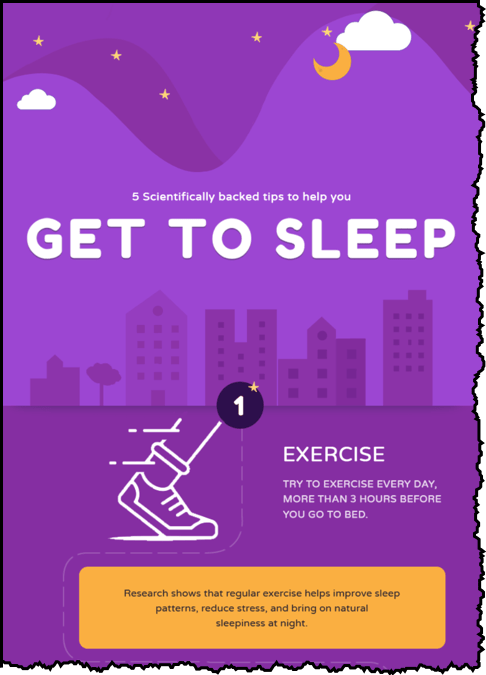5 Tips to Get to Sleep
Getting a good night’s sleep is vital for our health and emotional wellbeing. There are many scientific papers that state that healthy adults should get around 8 hours sleep per night, although for many among us, falling asleep quickly can be a challenge, and the more you try to get to sleep, the harder it is.
Sleep is a restorative and regenerative process that is absolutely essential for maintaining a good waking life. Sleep deprivation over the short term can lead to mood swings, poor coordination, difficulty focusing, and occasionally hallucinations. Long term sleep deprivation, however, can cause severe health issues such as memory problems, high blood pressure, obesity, and even stroke.
This infographic from DownDuvet.co.uk shows us five tips on how to get to sleep quickly.
How to get better sleep
1. Get regular exercise
Getting into good physical shape can really help those who find it difficult to fall asleep. Try to exercise daily, but avoid it too close to bedtime – around three hours before is fine, otherwise your body could still be alert and ready for movement.
Keeping a solid exercise routine keeps your body healthy and your internal clock functioning properly.
2. Keep your body clock in check
your body’s ability to fall asleep is strongly connected to our circadian rhythms (body clock), which has a tough time working as it should if you stay up extra late watching Netflix for a couple of nights per week. Try to go to bed at more or less the same time most nights, this will help your body know when it should be getting into sleep mode.
3. Eat the right foods
Walnuts, cashews, hummus, and eggs are all great for healthy sleep as they contain tryptophan, a natural sedative that can help reduce depression and anxiety, which are common causes for low quality sleep.
Almonds and bananas contain magnesium, which is great for relieving stress, and encouraging relaxation.
Caffeine is not a good idea before bed, and is best avoided up to six hours before you plan to sleep. Alcohol also reduces the overall quality of sleep, and soda contains too much sugar to be considered a good bedtime drink.
4. Get into routine
Having a proper bedtime routine can work wonders for people experiencing difficulty falling asleep. Refraining from using your smartphone, tablet, or laptop for at least 30 minutes before bed is a good idea, as the light from these devices keeps your brain alert.
A hot shower is excellent, as are gentle stretches and breathing exercises, to include as part of your bedtime routine.
5. Fix your bedroom
Having a computer or TV in your bedroom is a bad idea, as they make it difficult for you to ‘switch off’ before sleeping.
Fresh air from open windows is great, but make sure your room is quiet and dark enough to get good sleep without being woken up. Thick curtains and earplugs help if you’re in a bright/ noisy part of town.
A comfortable bed is essential, and an investment that will keep bringing benefits for years. High quality pillows and the correct duvet are a luxury item that you won’t regret buying.
Sleep well
We hope the information in this guide will be useful in helping you get to sleep quickly and easily for many years to come.
Thanks goes to Down Duvet for this infographic.
